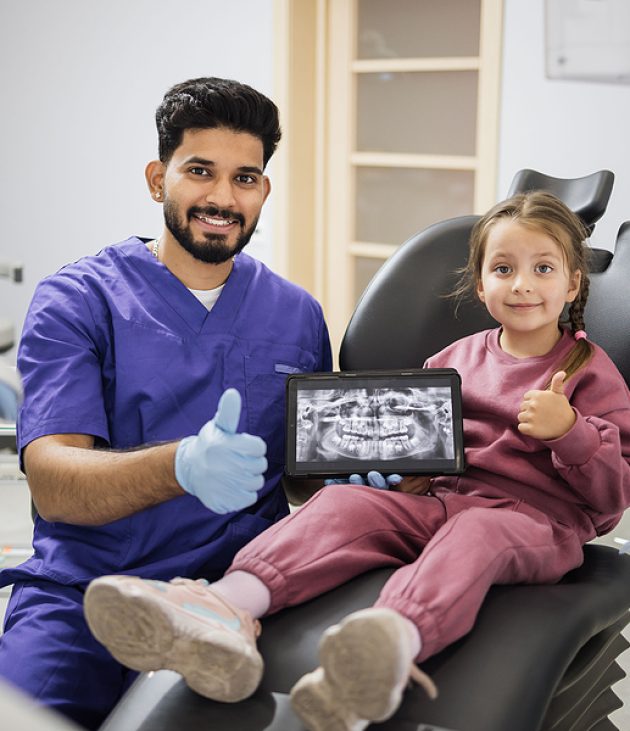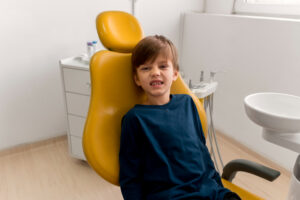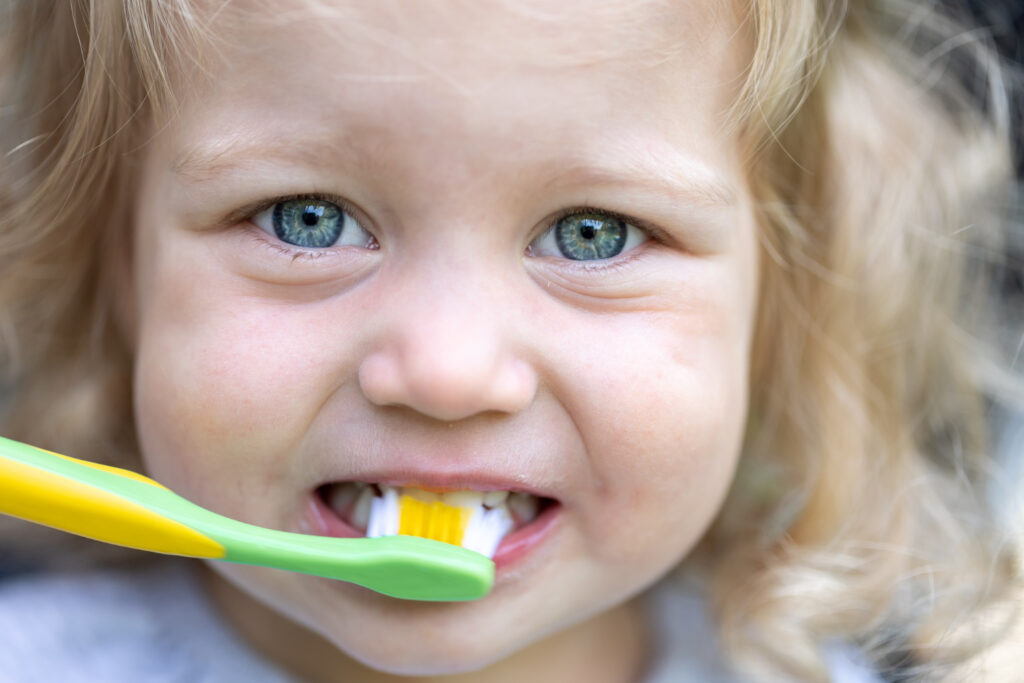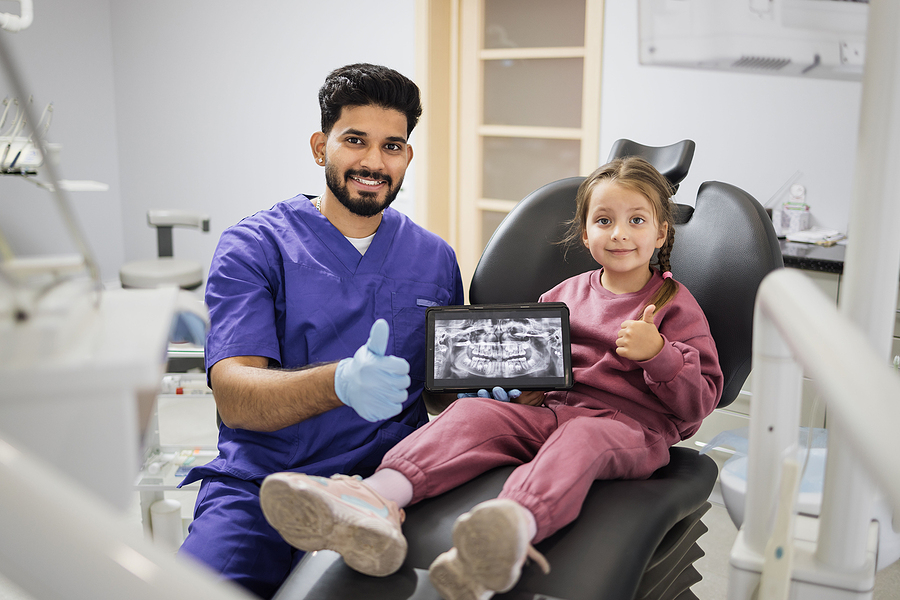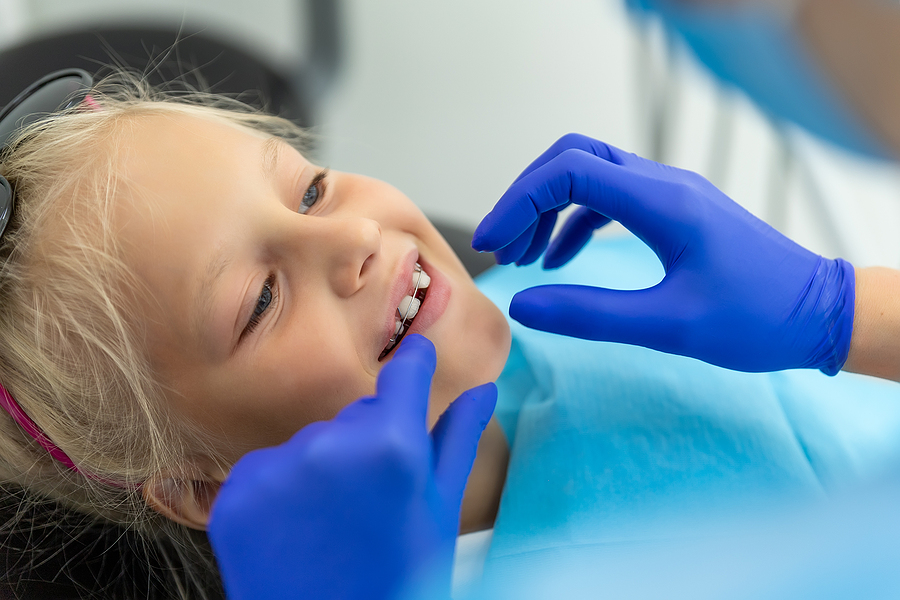Did you know that nearly 20% of children aged 5 to 11 have at least one untreated decayed tooth? Dental health is a crucial part of overall well-being, yet it often receives less attention than it deserves. Many parents ask, “When should my child see a dentist?”
Discover all the information you need to ensure your child’s smile is as healthy as possible. From deciding when to schedule the first dental visit to understanding what happens during the appointment, we will cover everything to ensure you’re fully prepared.
Understanding the Right Age for a First Dentist Visit
When should my child see a dentist?
Many parents wonder about the right time to take their child to the dentist for the first time. According to the American Dental Association, a child should visit a dentist by their first birthday or within six months after their first tooth appears, whichever comes first. This early visit can lay a solid foundation for a lifetime of good dental health.
Signs to Watch For
Beyond the general guideline, there are specific signs that might prompt an earlier visit. These include unusual staining, bad breath that doesn’t go away, or difficulties with chewing and swallowing. If you notice any of these signs, consider scheduling a visit to address potential issues before they escalate.
Benefits of Starting Early
When should my child see a dentist for the first time? Early visits are not just about spotting problems; they also help in building a comfortable relationship between your child and their dentist. Regular check-ups support the prevention of cavities and other dental issues and introduce your child to dental care routines in a friendly, non-threatening environment. This proactive approach can significantly diminish the likelihood of dental anxiety in the future, making routine visits a normal, stress-free part of life.
Benefits of Early Dental Visits for Children
Preventive Care
When should my child see a dentist for preventive care? The cornerstone of early dental visits is preventive care, which is designed to forestall the onset of tooth decay and gum disease—two common problems in young children. During these visits, dentists can apply sealants and fluoride treatments that strengthen the teeth and protect against cavities. They also provide an opportunity for parents to learn proper brushing and flossing techniques that they can teach their children, ensuring effective cleaning from an early age.
Habit Formation
Regular dental visits from a young age help children develop positive habits around oral hygiene. These early experiences in the dental chair teach them the importance of keeping their teeth clean and visiting the dentist regularly. Over time, these habits become ingrained, making it more likely that children will continue them into adolescence and adulthood.
Early Detection
During a dental visit, the dentist can identify early signs of issues that might not be visible to the untrained eye. This includes spotting minor cavities that can be treated easily before they become larger and require more invasive procedures. Early detection also includes monitoring the proper growth and alignment of teeth, identifying early signs of orthodontic needs, and ensuring that any developmental issues are addressed promptly. These checks are crucial, as they can have a significant impact on a child’s overall health and development.
Preparing Your Child for Their First Dental Appointment
Setting Expectations
Clear communication plays a pivotal role in preparing your child for their first dental visit. Explain what they can expect in simple, positive terms. For example, you might say, “The dentist will check your smile and count your teeth to make sure they’re healthy.” Keeping explanations light and positive helps prevent anxiety.
Role Play
Children often feel more comfortable and less anxious about new experiences when they know what to expect. You can play ‘dentist’ games at home where you gently examine your child’s teeth with a toothbrush, count them, and talk about keeping them shiny and clean. This playful approach makes the actual visit seem more like a fun activity than a scary ordeal.
Choosing the Right Dentist
Aside from asking, “When should my child see a dentist?”, selecting a dentist who is experienced in pediatric care can also make a significant difference. Look for a practice that is known for its child-friendly environment where staff are skilled in dealing with young patients. A good pediatric dentist will not only be great at dental care but also an expert in managing children’s fears and keeping them engaged and calm throughout the visit. Consider visiting the clinic beforehand to see if it feels welcoming and suitable for your child.
What to Expect During Your Child’s First Visit to the Dentist
Initial Examination
The first visit is typically more about getting acquainted with the dental environment and less about procedures. The dentist will gently examine your child’s teeth, gums, jaw, and bite, to check for any potential issues and to ensure everything is developing as expected. This may involve looking at the teeth and gums for any signs of decay, checking the bite, and gently feeling the areas around the jaws and inside the mouth.
Interaction with the Dentist
A pediatric dentist is trained to interact with children in a way that makes them feel safe and at ease. They often use simple words, fun phrases, and show-tell-do techniques, where they first explain what they are going to do, demonstrate it on a model or doll, and then proceed with the examination. This method helps demystify the process and keeps the child engaged.
Follow-Up Plans
Before you leave, the dentist will discuss the findings of the examination with you and recommend any necessary steps or treatments. They will also set up a schedule for regular check-ups, which are typically recommended every six months, to monitor the child’s oral health and ensure that any small problems are caught early. The dentist might also provide advice on how to care for your child’s teeth at home, including recommended brushing techniques, suitable toothpaste, and dietary suggestions that support dental health.
Frequently Asked Questions About Children’s Dental Visits
How long will the first visit last?
Typically, the first dental visit is brief, lasting about 30 to 45 minutes. During this time, the dentist will perform an examination and discuss any findings with you. The visit also includes time to address any questions you might have about your child’s oral health.
What if my child is scared?
It’s normal for children to feel nervous about new experiences. Pediatric dentists are skilled at making children feel at ease. They use comforting, playful language and may have a variety of tools and toys designed to distract and relax young patients. You can help by maintaining a calm, positive demeanor and reassuring your child throughout the visit.
Will there be any procedures done during the first visit?
The first visit is usually more about familiarization and less about procedures. If any minor preventive treatments, like fluoride applications, are needed, the dentist will discuss them with you before proceeding. Most treatments, unless urgently needed, are scheduled for follow-up visits.
How often should we return for check-ups?
Dentists generally recommend that children visit the dentist every six months for regular check-ups. These visits are important for maintaining dental health and quickly addressing any issues that may arise as your child grows.
What are the signs of good pediatric dental practice?
A good pediatric dental practice is welcoming and friendly, equipped with child-sized furniture and dental equipment, and staffed by professionals who are trained in pediatric care. The environment should be bright and cheerful, often decorated with playful themes. Good practices also involve parents in the process, providing clear communication and guidance on how to continue dental care at home.
Encouraging Ongoing Dental Health
Daily Oral Hygiene Tips
Establishing a daily oral hygiene routine is crucial for children. Teach your child to brush their teeth twice a day using fluoride toothpaste. For younger children, use a rice-sized amount of toothpaste, and for children over three years old, a pea-sized amount is recommended. Show them how to brush gently using circular motions, making sure they clean all surfaces of their teeth. It’s also important to start flossing once your child has two teeth that touch each other, teaching them to be gentle to avoid hurting the gums.
Diet and Oral Health
What your child eats plays a significant role in their dental health. Limit sugary snacks and drinks, which can lead to cavities. Encourage healthy eating habits by including plenty of vegetables, fruits, and water in their diet. Cheese and yogurt are great as they contain calcium, which can help strengthen teeth. Additionally, crunchy fruits and vegetables like apples and carrots can help clean teeth naturally.
Regular Check-Ups
Regular dental check-ups are essential to maintaining your child’s oral health. These visits allow the dentist to monitor the development and cleanliness of your child’s teeth and catch any issues early. They also reinforce the importance of dental health to your child, helping them to understand that taking care of their teeth is a normal part of life.
Trust Floss & Gloss Kids Dentistry for Your Child’s Dental Care
At Floss & Gloss Kids Dentistry, we understand the importance of establishing a positive dental experience for your child from the start. Specializing in pediatric dentistry, we offer a welcoming, kid-friendly environment designed to make dental visits enjoyable and stress-free for children of all ages. Our practice in Shoreline is not only colorful and interactive but also equipped with a caring team that excels in gentle dental care.
Our comprehensive services range from routine check-ups to specialized treatments, all tailored to meet the unique dental needs of children from infancy through adolescence. We take pride in educating both parents and children on effective dental care practices, ensuring every family leaves our office with the knowledge they need for a healthy dental future.
Choose Floss & Gloss Kids Dentistry, where we prioritize your child’s comfort and dental health. Let us help keep your child’s smile bright and healthy—call us today to schedule an appointment and experience the best in pediatric dental care!

